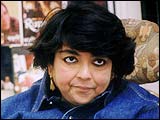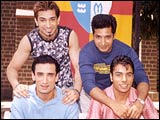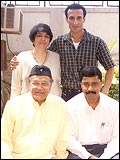Home > Movies > Interviews
The Rediff Interview/Kalpana Lajmi
Why can't a filmmaker experiment?
Deepa Gumaste |
August 28, 2003
 Kalpana Lajmi's films invariably make news - whether it is because stars like Dimple Kapadia and Raveena Tandon have bagged National Awards for hard-hitting performances for Rudaali and Daman or because of Lajmi's own penchant for announcing projects with megastars.
Kalpana Lajmi's films invariably make news - whether it is because stars like Dimple Kapadia and Raveena Tandon have bagged National Awards for hard-hitting performances for Rudaali and Daman or because of Lajmi's own penchant for announcing projects with megastars.
Shah Rukh Khan was meant to star in her film Darmiyaan but later backed out. Ditto Aishwarya Rai, who was supposed to do a film with her, but eventually did not.
Now, the gregarious filmmaker, known for her strong woman-oriented subjects, is ready with her latest venture Kyon? This is her first attempt at a subject rooted in contemporary urban society. Lajmi believes that unlike most other youthful films which have a feel-good appeal, Kyon? tackles real problems faced by rich teenagers in Indian metros.
 | More on rediff.com! |  | |
|
But with no big stars in her cast and a story with a darkish mood, the director is still wondering how to induce the urban youth to watch Kyon?What is Kyon? about?
Kyon? is a subject I have wanted to make a film about for the last couple of years. It concerns me to see the erosion of values in India today. Despite having everything, an entire generation of young people seems to have no focus. They like to experiment with anything, whether it is an intoxicant or a drug or alcohol or sex. They indulge themselves in non-productive activities, which in turn leads to crime and a widening gap between them and their parents.
What made you form this opinion of today's youth?
I have been reading and watching people. I have noticed that ever since the satellite explosion touched the smallest towns in India, the attitude of the younger generation has undergone a change. A consumerist approach to life, not being attached to any culture at home nor being able to identify with any progressive Western culture has left them in a strange kind of limbo.
It is not as if I am only blaming teenagers. Parents in nuclear families are terribly ambitious themselves and either don't have time to give their children or indulge them too much. When something goes wrong, they do not know how to handle the situation, often trying to hush things up. These are some of the issues I am trying to tackle in Kyon?
Haven't a lot of films focused on the urban youth in recent times?
Yes, but everyone else is making feel-good films. Kyon? is a film about the dark side of the urban youth.
 | Would you like to tell us |  | |
|
You have always made strong women-oriented films. Why have you suddenly switched tracks to a story about teenagers?
This film too has a strong female protagonist like all my earlier ones. I have never repeated my subjects, my stars and my style. I liked this subject and hence decided to go ahead and make Kyon?
How did you select the group of youngsters who play the lead in Kyon?
I auditioned 75 boys and girls before I selected these five. After the cast was finalised, we had workshops before and during the making of the film. We made character sketches for each of the actors and taught them how to deliver dialogues before a camera.
Everyone laments about the lack of new talent in cinema, but we don't have a proper institute to train people how to act. Nor is the concept of acting workshops popular in this country. As a result, when a filmmaker casts newcomers, they have to be taught everything from scratch.
How different was it working with newcomers as opposed to established stars who have featured in your earlier films? Why did you not choose any known faces?
The fact that they were fresh helped because they made an attempt to do whatever one asked of them. Since the kids in the film are in the age group of 17-22, it was difficult to find stars who would fit that bracket. Also, I don't think the present generation of film stars likes to shed their image.
I wanted five boys and girls to come across as the characters I have written, characters that are grey. They are victims of crimes, as well as perpetrators of crime. I wanted fresh actors willing to give me time for rehearsals. Besides, the subject doesn't demand the presence of a star.
Haven't some of the youngsters you have chosen already acted in other films?
Yes. Chaitanya Choudhary made his debut in Dev Anand's Love At Time Square. Sanobar Kabir, who plays the central character in the film, also made her debut in the same film. She is a fine actress and I didn't have to toil with her at all. Sachit Patil is a regular in Marathi theatre while Amit Jain is making his acting debut although he has featured in a couple of ad films.
What I liked about them is that they did their homework, planned their scenes together and even helped each other out.
The only known face in your film is Rahul Dev. How does he fit in with the young bunch?
Rahul has been in touch with me for the last three years and has always expressed a desire to work with me. I had approached several established stars, but they were not interested.
Rahul has a long way to go as an actor because I think his performances are a little too understated. For my film it was fine because his character is that of an upright cop who represents the conscience of society and it required a soft and muted presence.
What I like about him is that he experiments with different types of roles and doesn't mind sharing the screen with other actors. The problem with our so-called stars is that they are so focused on themselves that they forget they are supposed to play a character.
 But hasn't this trend changed with stars featuring in smaller experimental films?
But hasn't this trend changed with stars featuring in smaller experimental films?
It's all hogwash. All the mainstream stars I have worked with in the past, whether Dimple, Rakhee, Tabu or Raveena Tandon, were actually eager to work in realistic cinema.
Today, the younger generation of actresses who have yet to prove that they can act - be it Bipasha Basu, Lara Dutta or Priyanka Chopra - have no inclination to do anything offbeat. Even a Rani Mukerji, who is a brilliant actress, says "Come to me when I am 30!"
What they don't realise is that even a Shah Rukh Khan had done non-mainstream cinema in the early stages of his career.
It is actually a vicious circle. Financiers want stars before they put money on the table, irrespective of whether they fit the character or not. If you go to someone like Bipasha Basu, she will turn around and tell you that she doesn't want to work with Rahul Dev but with Ajay Devgan.
Do these model-turned-stars realise they cannot survive unless they know how to act? And the only way to learn how to act is by doing realistic cinema. How much of mainstream cinema can actually teach you the art of acting?
The general impression is that with multiplexes, there is a large urban audience for niche cinema.
This is a myth. Even distributors like Shringar Films who are known to release small films will not buy a film which does not have at least one saleable name. It is true that there is an audience interested in seeing new ideas, faces and filmmakers. But that kind of cinema is not being allowed to reach audiences. Unless the exhibitors, distributors and filmmakers together decide to create a new setup, nothing will change.
This star system will continue.
Isn't it true that many corporates are investing money in smaller films?
iDream Productions is doing some interesting work. But by and large, corporate bigwigs have no clue about cinema. The man or woman at the helm of affairs at least needs to understand the basics of filmmaking. After all, this is not a tangible commodity which can be manufactured by anyone.
Besides, there is an innate arrogance in the corporate world's approach to people. Whether it is television channels or industrial houses interested in producing films. These people approach you with a great deal of scepticism and run you through a rigorous screening process although they themselves are totally clueless about cinema.
Even banks that claim they are willing to finance films want all kinds or written guarantees, including when and where you plan to distribute your film. Today, no distributor will commit himself to buying a film before it is made.
How did you manage to raise finance for Kyon?
Sadanand Shetty, the man who has financed my film, does a lot of work for the Oil and Natural Gas Commission and is involved in the ship repairing business. He was genuinely interested in making this film and stood by me even when we overshot the modest budget. Now he is helping me ensure that the film gets a proper release.
I just hope he recovers his money otherwise producers like him will stop investing money in sensible cinema.
Do you foresee things looking up for filmmakers like yourself in the near future?
I don't know. People have yet to understand that a film is not about a hero and a heroine. It is about storytelling. Is it any wonder that films are not even running for two weeks these days? Our industry folk keep blaming external factors like cricket, rain and school and college exams for their own failure.
There was a time when realistic cinema existed in mainstream cinema. Today, for some strange reason, everyone is expected to only make feel-good films.
Why shouldn't a filmmaker have the freedom to experiment? Why should the media write more about Rituporno Ghosh than about Aparna Sen? Is it only because he has a star in every film while she makes the film she believes in?
I just hope this attitude changes so that people like me can concentrate on the creative aspect of cinema instead of worrying about how to market and promote a film.
Click here for More Interviews